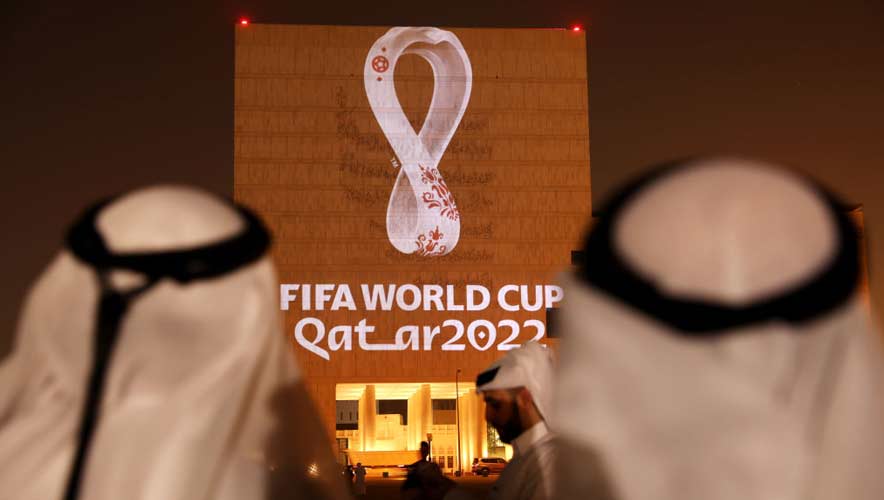World Cup Watch: Qatar Prepares for 2022 Tournament Opening
After a contentious FIFA decision and 12 years of planning, the 2022 FIFA World Cup will begin on Sunday in Qatar when the host country enters the pitch to take on Ecuador.
FIFA anticipates that more than 1 million people will attend the World Cup’s 64 matches in eight different stadiums during the 28-day tournament, while more than 3 billion people will watch the competition on television. FIFA officials took the unusual step of moving the tournament to the winter season in Qatar (when the average temperature is 24 to 28 degrees Celsius, 75 to 82 degrees Fahrenheit) to protect athletes and spectators from summer heat.
Hosting the 2022 World Cup is a major sporting endeavor, but it also marked a significant transformation for the host country itself. Qatar built seven stadiums, a transit system, an airport, housing developments, and a sewage system to prepare for the event.
“This will be the most remarkable World Cup,” said Ahmad Khalil, a former member of Qatar’s football team that won the Arabian Gulf Cup in 1992, in a press release. “The infrastructure that has been put in place, the compact nature of the tournament, the vast transportation network and the state-of-the-art stadiums are all exceptional. The tournament will be a source of pride for the entire region, and will impress the entire world.”
Below we take a look at some of the security challenges and opportunities as the 2022 World Cup begins.
Stadium Security
As the governing body for international football, FIFA has established security standards for stadiums and countries that host the World Cup. Qatar was required to name a national security officer, a senior national security advisor, and individual stadium security officers. These individuals coordinate contingency plans, create emergency procedures and major incident plans, designate the level of policing and support necessary from other agencies, and more.
Qatar also trained more than 50,000 people to provide security during the World Cup, including summoning diplomats for mandatory military service at stadium security checkpoints. All Qatari men ages 18 to 35 are required to train for military service for four months.
“The conscripts are training to manage stadium security queues, frisk fans, and detect contraband like alcohol, drugs, or weapons concealed in ponytails, jacket linings, or even false bellies,” Reuters reports.
Additionally, Turkey is providing 3,000 riot police to assist the security effort, and Project Stadia—a partnership between Qatar and INTERPOL—will help with policing and security efforts throughout the tournament.
One about-face security decision announced on Friday was Qatar’s decision to ban beer sales in World Cup stadiums. Budweiser is the official beer sponsor for the World Cup, and it was unclear how the officials’ decision would affect that designation. The sponsorship is worth $75 million for each four-year World Cup cycle, according to The New York Times.
Outside of the stadiums, Qatar has also enhanced security for the areas where fans will travel and gather together when not watching matches. Officials have introduced crowd control barriers, restructured vehicle traffic flows, placed portable toilets, and stressed that residents should heighten their home security.
“Qataris, used to living in one of the world’s safest states, are increasingly concerned about potential vandalism, theft, and unruly behavior when some 1.2 million visitors descend on the tiny nation, which has a population of 3 million,” Reuters reports.
Cybersecurity and Privacy
As a major international event, the World Cup is likely to attract attention from cyber threat actors as part of efforts to scam attendees and fans, according to cybersecurity firm Digital Shadows.
“For instance, financially-motivated threat actors often plant malicious URLs spoofing these events to fraudulent sites, hoping to maximize their chances of scamming naïve Internet users for a quick (illicit) profit,” Digital Shadows explained in a blog. “At the same time, hacktivist groups may exploit the public attention given to such events to exponentially increase the reach of their message. State-sponsored advanced persistent threat (APT) groups may also decide to target global sporting events like the Qatar 2022 World Cup to achieve state goals to the hosting country or the broader event community.”
Hacktivist groups have been very active in 2022 following Russia’s invasion of Ukraine, Digital Shadows found, and they may target the World Cup events due to Qatar’s human rights record and forced labor concerns surrounding the construction of World Cup sites.
Additionally, authorities and privacy experts have raised concerns about the smartphone apps that Qatari officials are requiring World Cup attendees to download. The Ehteraz app is required for COVID-19 tracking, and the Hayya app is required to gain entrance to the stadium and access public transportation services.
European data protection regulators have urged individuals not to use these applications or only download them on a burner device because they pose major privacy risks, Politico reports.
“One of the apps collects data on whether and with which number a telephone call is made,” the German data protection regulator said. “The other app actively prevents the device on which it is installed from going into sleep mode. It is also obvious that the data used by the apps not only remain locally on the device, but are also transmitted to a central server.”
Other data regulators are encouraging World Cup attendees to not travel to Qatar with their devices; instead, French regulator CNIL recommends using a burner phone to avoid data and privacy violations.
The Committee to Protect Journalists (CPJ) also released a series of best practices for journalists and media representatives traveling to Qatar to cover the tournament.
“Journalists working in the small nation bordering Saudi Arabia have faced digital security threats, legal issues, and challenges associated with cultural sensitivities,” the CPJ wrote. “The Qatari government, which operates under a monarchy headed by the ruling Emir, has low tolerance for critical reporting on domestic issues, and journalists covering human rights have been detained.”
Geopolitics and Security
Qatar is a small nation of just 2.9 million people who live on a peninsula that juts out from Saudi Arabia, with the United Arab Emirates, Kuwait, Iraq, and Iran nearby. Following Iraq’s invasion of Kuwait in the early 1990s, the ruling family of Qatar sought out ways to gain soft power to bolster its security. A key aspect of this has been boosting Qatar’s international stature by hosting significant sporting events and acquiring sporting teams.
In 2006, Sheikh Tamim bin Hamad Al Thani, emir of Qatar, chaired the organizing committee for the 2006 Asian Games (which Qatar hosted). He also organized Qatar’s purchase of the Paris Saint-Germain football club and led the bid to host the 2022 World Cup.
“Football and sport serve for the protection of the country,” said Danyel Reiche, professor at Georgetown University-Qatar who spoke to ESPN. “Visibility, influence and international affairs, national security, and also a form of branding to be interesting for tourists and investors. Also initiating a process of economic diversification, I think those are the reasons.”
Hosting the World Cup will also help the nation achieve its Qatar National Vision 2030, a government initiative to transform Qatar into a global society with a higher standard of living. The infrastructure and spending related to creating host sites for the 2022 tournament has already helped Qatar grow its non-energy economy—a key goal of the vision.
“By hosting such a worldwide event as the FIFA World Cup, Qatar is aiming to use the power of sport to achieve several objectives: increase the visibility of the Muslim World in a more positive light, strengthen the bonds among Muslim youths through solidarity and common love of sport, and establish Qatar’s alliances with prominent global political and financial partners to achieve its long-term sustainability plans away from volatile hydrocarbon revenues,” wrote Thomas Bonnie James and Sarah Muhanna Al-Naimi, of Georgetown University-Qatar.










